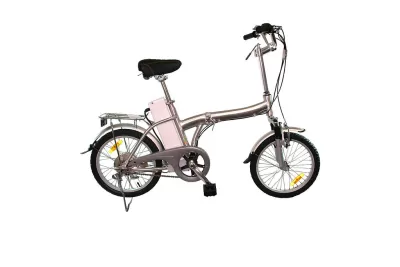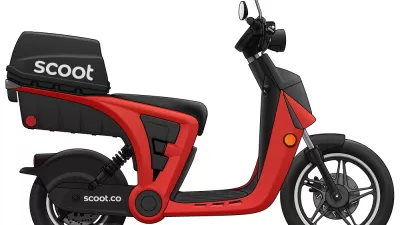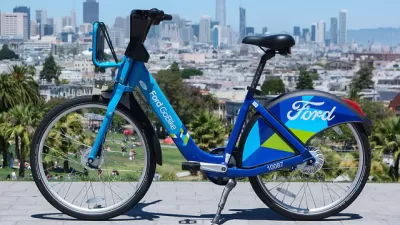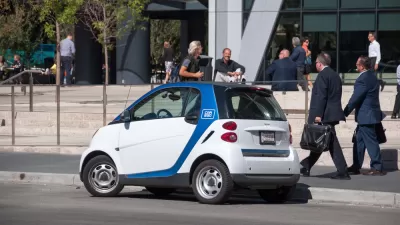Electric Bike Share! The new program is set to launch in famously hilly San Francisco and across the bay in Berkeley next spring. Unlike the region's bike share which just launched August 29, it will be administered by the non-profit City Car Share.

For new cyclists who may have found themselves incapable of climbing San Francisco's steep hills with Bay Area Bike Share (BABS) bikes, help is on the way in the form of an environmentally-friendly alternative, also with two wheels: the electric power-assist bike.
Lydia Tuan writes about a unique program that "partners City CarShare, a Bay Area nonprofit car-sharing service, with the Transportation Sustainability Research Center at the UC Berkeley Institute of Transportation Studies. The program will provide 90 bikes, and 22 of the 90 will be electric cargo bicycles, at up to 25 locations, eight of which are in Berkeley", she writes.
According to Susan Shaheen, co-director of the research center and leader of the electric-bicycle project, the project may be the first to be tested in the United States.
For the record, Berkeley has steep hills as well - they are just not as well-known.
“The idea is that (the electric bicycle) becomes a resource, very much like a Zipcar,” said Daniel Kammen, co-director of the Transportation Sustainability Research Center. “You can go shopping and do various things up and down Berkeley’s hills. You’ll need the electric feature to get back and forth.”
To rent an electric-assist bike, you will first have to join City CarShare. Unlike BABS, where you can pick up the bike in one location and drop it off at another, e.g. from the SF Caltrain Station and then bike one to two miles away to the financial district, you'll have to return the electric bike to its original location.
According to Anita Daley, marketing director of City CarShare, the cost of sharing an electric bike is 40 to 60 percent less than the cost of sharing a car, and bikers will not be charged a mileage fee.
Jessica Kwong of the San Francisco Examiner writes that the pilot program will "cost about $2 million over three years". Funding will come from the San Francisco Municipal Transportation Agency that includes "a $740,000 grant from the Federal Highway Administration". Tuan writes that on August 20, the "SFMTA board of directors voted to grant $1.5 million for the program."
The role of the federal government was critical to launching the program, wrote Jose Garthwaite in The New York Times Green Blog last year.
The Federal Highway Administration’s Value Pricing Pilot Program [a relic of the 2005 SAFETEA-LU] awarded $1.5 million for the initiative through the San Francisco Metropolitan Transportation Agency, the project’s fiscal sponsor. Ultimately the money will go to the local nonprofit City CarShare, which plans to integrate the e-bikes and trailers with its existing car sharing service, and to the Transportation Sustainability Research Center at University of California, Berkeley, which is responsible for assessing the impact and lessons learned from the project.
FULL STORY: Electric-bicycle-sharing pilot program to launch in Berkeley, San Francisco in 2014

Alabama: Trump Terminates Settlements for Black Communities Harmed By Raw Sewage
Trump deemed the landmark civil rights agreement “illegal DEI and environmental justice policy.”

Study: Maui’s Plan to Convert Vacation Rentals to Long-Term Housing Could Cause Nearly $1 Billion Economic Loss
The plan would reduce visitor accommodation by 25% resulting in 1,900 jobs lost.

Why Should We Subsidize Public Transportation?
Many public transit agencies face financial stress due to rising costs, declining fare revenue, and declining subsidies. Transit advocates must provide a strong business case for increasing public transit funding.

Paris Bike Boom Leads to Steep Drop in Air Pollution
The French city’s air quality has improved dramatically in the past 20 years, coinciding with a growth in cycling.

Why Housing Costs More to Build in California Than in Texas
Hard costs like labor and materials combined with ‘soft’ costs such as permitting make building in the San Francisco Bay Area almost three times as costly as in Texas cities.

San Diego County Sees a Rise in Urban Coyotes
San Diego County experiences a rise in urban coyotes, as sightings become prevalent throughout its urban neighbourhoods and surrounding areas.
Urban Design for Planners 1: Software Tools
This six-course series explores essential urban design concepts using open source software and equips planners with the tools they need to participate fully in the urban design process.
Planning for Universal Design
Learn the tools for implementing Universal Design in planning regulations.
Smith Gee Studio
Alamo Area Metropolitan Planning Organization
City of Santa Clarita
Institute for Housing and Urban Development Studies (IHS)
City of Grandview
Harvard GSD Executive Education
Toledo-Lucas County Plan Commissions
Salt Lake City
NYU Wagner Graduate School of Public Service





























